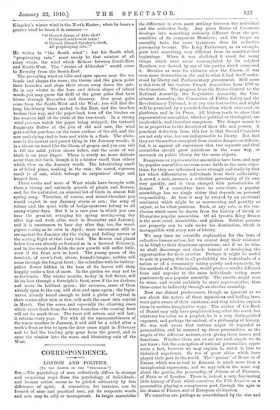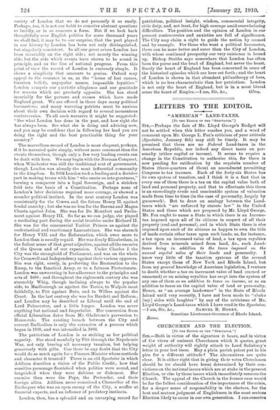CORRESPONDENCE.
LONDON AND POLITICS.
[To THE EDITOR OP THE " SPECTATOR."] SIR,—The psychology of man collectively differs in strange and surprising ways from the psychology of individuals ; and human action seems to be guided ultimately by this difference of spirit. A committee, for instance, can he formed of sane and practical- men, yet its corporate words and acts may be silly or incompetent. In larger assemblies
the difference is even more striking between the individual and the collective body. Any given House of Commons develops into something curiously different from the per- sonalities of its component Members ; and the longer an assembly lasts, the more tyrannous does its collective personality become. The Long Parliament, as an example, grew into something very different from its constitutional beginnings. When it was abolished it stood for many things which were never contemplated by its original Members, nor desired by any of the parties which composed it. Decisive as were its victories over the Crown, it was even more destructive in the end to what it had itself under- stood by liberty and Parliamentary government. Still mm•e is this true of the various French Assemblies from 1789 to the Consulate. The progress from the States-General to the National Assembly, the Legislative Assembly, the Con- stituent Assembly, the Committee of Public Safety and the Revolutionary Tribunal, is at any rate instructive, and might well be pondered by a pseudo-Liberalism which runs mad on platforms and in its Press. All history tends to show that representative assemblies, whether political or theological, are incalculable, and therefore dangerous. The danger seems to be in proportion to the duration of their life and powers. A. practical deduction from this law is that Second Chambers are not only wise, but are indispensable to liberty. Not that they are themselves exempted from similar dangers or defects; but it is against all experience that two separate and rival assemblies should grow ambitious in the same way, or encroach on public liberty for the same objects.
Dangerous as representative assemblies have been, and may be, popular assemblies are even more liable to the same objec- tions, for they are influenced more strongly and easily by that law which differentiates individuals from their collectivity. A crowd, a mob, assumes a collective personality of its own very quickly, and is then charged with potentialities of danger. If a committee have no conscience, a popular assemblage has no single virtue that depends on personal responsibility. At best it may be swayed by an emotional sentiment which might be as unreasoning, and possibly as unjust, as its vilest passions. Such, at any rate, is the con- clusion which must be drawn from the history of Greek or Florentine popular assemblies. Of all tyrants King Demos is the most cruel, irresistible, and pitiless. Neither persons nor property can be safe under his domination, which is incompatible with every sort of liberty.
We may have no scientific explanation for the laws of collective human action, but we cannot deny their existence or be blind to their disastrous operations; and if we be wise, we shall discourage and check, instead of developing, the opportunities for their exercise. Perhaps it might be useful to note in passing that in all probability the individuals of a nation or of a community voting quietly and separately, by the methods of a Referendum, would produce results different from and superior to the same individuals voting more passionately as a popular assembly. The results might even be wiser, and would certainly be more representative, than those come to indirectly through an elective assembly.
Now our distant predecessors, though as ignorant as we are about the nature of these mysterious and baffling laws, were quite aware of their existence, and they tried to explain them in various imaginative ways. The author of the Book of Daniel may only have prophesied long after the event, but whatever his value as a prophet, he is a very distinguished exponent, and perhaps the earliest, of a philosophy of history. He was well aware that nations might be regarded as personalities, and he summed up those personalities as the angels of the different nations, even giving them names and functions. Whether there are or are not such angels we do not know ; but the conception of national personalities repre- sents a fact, however we may explain it, which is true to historical experience. So too of great cities which have played their part in the world. The " genius " of Rome or of Caesar, which was so real to Romans, is much more than a metaphorical expression; and we may talk in the same way about the genius, the personality, of Athens or of Florence, of Paris or of London. There is, indeed, a very fascinating little history of Paris which conceives the Ville Lumiere as a personality, playing a conspicuous part through the ages in the drama of France, and of European civilisation.
We ourselves are perhaps so overwhelmed by the size and variety of London that we do not personify it so easily. Perhaps, too, it is not our habit to conceive abstract questions so lucidly, or in so concrete a form. But if we look back thoughtfully over English politics for some thousand years we shall find, it may be to our surprise, that the part played in our history by London has been not only distinguished, but singularly consistent. In all our great crises London has been invariably on the right side ; not merely the winning side, but the side which events have shown to be sound in principle, and on the line of national progress. From this point of vie v the record of London is curiously simple. It shows a simplicity that amounts to genius. Oxford may appeal to the romance in us, as the " home of lost causes, forsaken beliefs, unpopular names, impossible loyalties." London compels our r atriotic allegiance and our gratitude for reasons which are precisely opposite. She has stood invariably for the persons and causes which have made England great. We are offered in these days many political barometers ; and many wavering patriots must be anxious about their own decision with regard to several momentous controversies. To all such waverers it might be suggested : " See what London has done in the past, and how right she has always been. See what she is doing and advising now, and you may be confident that in following her lead you are doing the right and the best practicable thing for your country."
The marvellous record of London is most eloquent, perhaps, if it be narrated quite simply, without more comment than the events themselves, though only a few very leading events can be dealt with here. We may begin with the Norman Conquest, when Winchester was still the traditional seat of government, though London was already the most influential community in the kingdom. In 1066 London took a leading and a decisive part in making terms with him " who smote us into greatness," turning a conqueror into a. legal Sovereign, and a stricken field into the basis of a Constitution. Perhaps none of London's later decisions required more courage, or showed a sounder political instinct. In the next century London was consistently for the Crown and the future Henry II. against feudal anarchy ; but she was no less for the Barons and Magna Charta against John. She was for De Montfort and Parlia- ment against Henry III. So far as we can judge, she played a mediating part during the social troubles under Richard II. She was for the commercial Yorkist Princes as against the ecclesiastical and reactionary Lancastrians. She was staunch for Henry VIII. and the Reformation, which owes more to London than is usually repaid. She was firmly Elizabethan, in the fullest sense of that great adjective, against all the enemies of the Queen and of our expansion. Under Charles I. the City was the stronghold of Parliament, and was on the whole for Cromwell and Independency against their various opposers. She was right, surely, in preferring the Restoration to the Rump, to the fanatical Army, or to a fatuous Protectorate. London was unwavering in her adherence to the principles and acts of 1688; and throughout the eighteenth century she was staunchly Whig, though inclining always to the popular side, to Marlborough as against the Tories, to Walpole most faithfully, to Pitt against Bute, and to Wilkes against the Court. In the last century she was for Burdett and Reform ; and London may be described as Liberal until the end of Lord Palmerston, and a little longer. London was never anything but national and Imperialist. Her conversion from official Liberalism dates from Mr. Gladstone's perversion to Home-rule. The existing breach between the City and current Radicalism is only the extension of a process which began in 1868, and was intensified in 1886.
The patriotism of London is as striking as her political sagacity. She stood manfully by Pitt through the Napoleonic War, not only bearing all necessary taxation, but helping generously with gifts. Can there be any doubt that the City would do as much again for a Finance Minister whose methods and character it trusted P There is an Old Spectator in which Addison describes a vision of the Public Credit; how that sensitive personage flourished when politics were sound, and languished when they were dubious or dishonest. Her enemies then were the Pope, the Pretender, and their foreign allies. Addison never conceived a Chancellor of the Exchequer who was an open enemy of the City, a scoffer at financial experts, and an inflamer of predatory instincts.
London, then, has a splendid and an unvarying record for patriotism, political insight, wisdom, commercial integrity, civic duty, and, not least, for high courage amid overwhelming difficulties. The position and the opinion of London in our present controversies and anxieties are full of significance. The City may claim a right to guide the nation by zounsel and by example. For those who want a political barometer, there can be none better and surer than the City of London, with whose continued prosperity our very existence is bound up. Bishop Stubbs says somewhere that London has often been the purse and the head of England, but never the heart. Surely the heart of England has been concerned in some of the historical episodes which are here set forth ; and the heart of London is shown in that abundant philanthropy of hers, which is no less characteristic than her patriotism. London is not only the heart of England, but is in a most literal sense the heart of Empire.—I am, Sir, &c., Oir'rts.







































 Previous page
Previous page